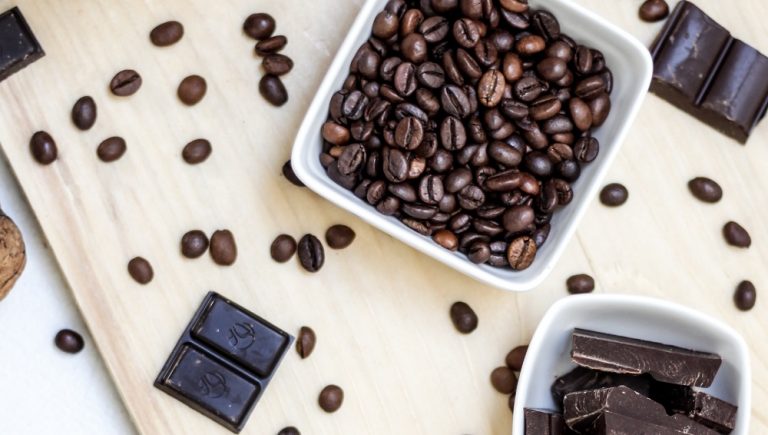By Lyndal Phillips | September 2017
Top 5 intriguing health claims that help justify responsibly indulging!
Dark chocolate: the medicinal treat
If you love chocolate, come over to the dark side for some unexpected health benefits.
Anti-aging
Dark chocolate is rich in the feisty flavonoids. These plant compounds act as defensive antioxidants to protect our bodies from the aging caused by nasty free radicals.
Healthy heart
Just a couple of squares of dark chocolate a day has been scientifically proven to support your heart and cardiovascular system. The good news is, according to research, indulging daily lowers blood pressure and reduces cholesterol.
Mood enhancer
The great taste of dark chocolate stimulates endorphin production which in turn enhances feelings of pleasure and well-being. Dark chocolate has also been shown to have a positive impact on mood-regulating neurotransmitters including serotonin and dopamine.
Espresso: more than just an energy boost
There are some interesting health benefits associated with the moderate consumption of espresso coffee.
Prevents diabetes
According to researchers at University of California, Los Angeles (UCLA), drinking espresso may be a protective factor against type 2 diabetes. The study successfully proved an ‘inverse association’ between coffee consumption and the risk of developing type 2 diabetes.
Prevents liver cancer
There is new evidence to suggest that imbibing black gold has the potential to protect against liver cancer. A research study conducted by Italian scientists concluded that coffee consumption lowers the risk of liver cancer by approximately 40%.
Prevents inflammation
Caffeine is thought to suppress the production of proinflammatory cytokines. These nasty cytokines are responsible for the systemic inflammation that produces fever, inflammation and tissue destruction. Just think, your daily espresso might be a preventative measure against inflammatory diseases including Multiple Sclerosis and Parkinson’s Disease.
Red wine: loves your heart
For those who enjoy a glass with dinner, the good news is that red wine has long been considered heart healthy.
Fewer heart attacks
The links between red wine and fewer heart attacks are under investigation. Simply put, it is thought that the antioxidants found in red wine may increase levels of ‘good’ cholesterol, and protect against the build-up of ‘bad’ cholesterol.
It’s all about resveratrol
Resveratrol might be the magic ingredient in red wine that helps prevent damage to blood vessels, reduces cholesterol and prevents blood clots. Early research suggests that resveratrol might be linked to a lower risk of the inflammation and blood clotting that can sometimes lead to heart disease.
Everything in moderation
Too much alcohol can have harmful effects on your body. Doctors are understandably wary of encouraging anyone to start drinking alcohol, particularly those with a family history of alcohol addiction. As with many of life’s pleasures, alcohol in moderation is best.
Champagne: bubbles for brain health
The results of a recent scientific study of Champagne or sparkling wine consumption might just warrant a bubbly celebration.
Improves memory
A university study has discovered that moderate consumption of Champagne or sparkling wine has the potential to positively influence cognitive functioning. This means that a little bit of Champers every now and then might serve to improve memory and spatial awareness. Here’s cheers to that!
Prevents dementia
The same study suggests that up to three glasses of sparkling wine a week might help delay the onset of degenerative brain disorders, including dementia. To confirm this hypothesis, scientists hope to conduct a trial which requires fifty pensioners to drink Champagne for three years! Any volunteers?
Protects the heart
Just like red wine, sparkling wine is made from red grapes. A study has found that sparkling wine has a beneficial effect on the walls of blood vessels and therefore the potential to reduce strokes and heart disease. The researcher responsible for this study has labelled his findings as ‘very exciting news.’ We can’t help but agree, whole-heartedly!
Cheese: smile with confidence
Not only does cheese taste good, when consumed in moderation, it can provide a range of benefits to the body.
Enhances dental health
The nutrients in cheese play a protective role in the health of your teeth. The Australian Dental Association recommends eating a small amount of cheese after meals because the nutrients in cheese can prevent the build-up of acid on your teeth. Consuming cheese may also stimulate saliva, which also helps to reduce dental problems.
Improves bone health
Characterised by reduced bone density and increased risk of fractures, osteoporosis is a degenerative bone disease. The consumption of dairy products, including cheese, has long been recognised as an effective strategy against osteoporosis, especially among elderly women.
Supports heart health
The regular consumption of milk products appears to be beneficial for heart health. The unique combination of calcium, potassium and magnesium found in milk products, including cheese, may reduce hypertension and heart disease.
When consumed as part of a balanced diet, cheese is a satisfying snack that can help you to reach or maintain your ideal weight, thus further supporting heart health.
What do you think, have these intriguing health claims helped justify responsibly indulging?
Photo (cropped from original) by NordWood Themes on Unsplash




